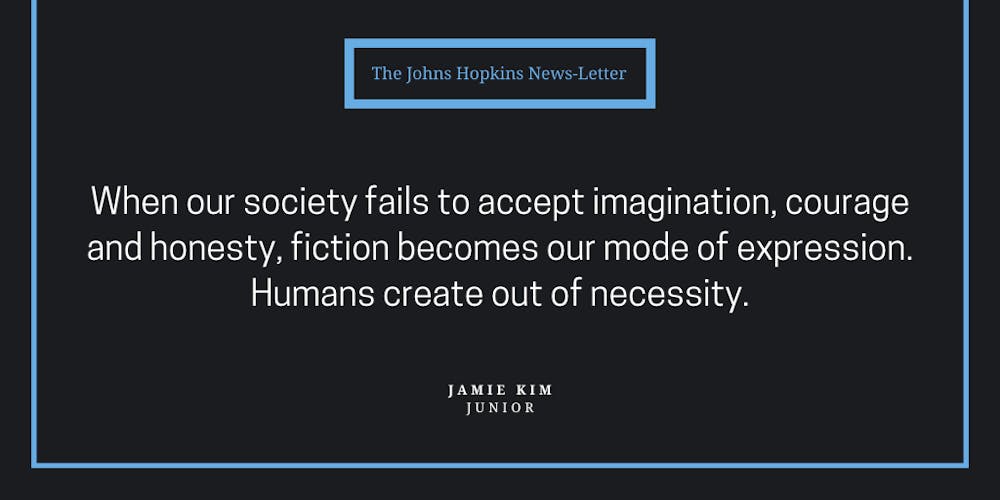
Three out of four members of my family love watching Korean dramas. The one member, my father, who doesn’t like watching dramas always argues that, at the end of the day, it's fiction and we gain absolutely nothing from it except warm fuzzy feelings. Is fiction really that irrelevant?
Fiction gives people the chance to cultivate imagination and go beyond the boundaries of reality. It allows individuals to stretch their thoughts and create their own world. In some ways, this grants people an opportunity to flee from the stresses of their harsh, routine lives.
One of the most popular sub-genres in fiction is romance. Gen Z readers are especially voracious consumers of romance, and romance novels — such as Crazy Rich Asians, To All the Boys I’ve Loved Before or even the Twilight series — are in demand because they provide people a getaway into an ideal romantic life.
I might personally find the love stories cringey, but I can understand the appeal — the descriptions and actions of the love interests’ intimacy and adoration for each other depict a utopic love life that is hard to find in our real world.
Fiction can also allow us to look beyond our horizons and contemplate new innovations. The technology that we consider ordinary and mundane would have been seen as “new and utopic” just a few decades ago.
Growing up, I watched TV shows like Kim Possible and found myself inspired by inventions like watches that could be used as talking devices and phones that transmit images and video conferences. All of this was being broadcasted before the launch of the first iPhone.
Fiction inspires us to innovate and create, especially in our current technology revolution. Not all ideas can be carried out, but fiction still serves as the perfect medium to give form to our imagination.
Fiction is also courageous and brutally honest. It is a window to the parts of our society that we fail to speak about. There is a reason why some books in the past were banned and burned by governments across the world. They spoke magnitudes of truth about our history.
In high school, I read George Orwell’s 1984. I was shocked to learn that the book was banned in Russia and China for criticizing communism and in the United States for having “strong political and social” messages. On the surface, the book is complete fiction — it doesn’t talk about any “real” countries and all the characters and settings are made up.
But, underneath this dystopian narrative, 1984 has layers of truth — truth that many governments found challenging and threatening. The government banned these books because they were afraid of the veracity contained within their contents and the growing voices of the people who were reading these books.
1984 was bold, but it created an even bolder movement in people's minds. Eventually, the book was uncensored because the ban was deemed as a violation of the freedom of speech and thought.
Other times, fiction is used as a facade to reveal a world that underlies our reality by expressing truths that would otherwise be condemned. It clearly designates the lines between the rich and poor, the healthy and sick, the famous and the obscure.
It is hard to speak of these topics in person in our society because it is so frowned upon. But, fiction allows us to speak our minds with the justification that it isn’t real.
I recently watched a Korean movie on Netflix called Space Sweepers, which depicted what life might look like in 2092, nearly seven decades from now. The movie is entirely science fiction, but it discusses present-day issues, like the wide gaps between wealth and poverty in many countries and across many cultures.
The show criticizes the wealthy for constantly taking advantage of the poor and then quickly disposing of them when they become useless. And while many shout dissent at the wealth gap in our world today, most people believe that the gap will be closed in the future. But, realistically speaking, I find myself wondering if that will really happen.
Space Sweepers shows a brutally honest message: the wealth gap will likely still exist even seventy years into the future, and it might even grow more prominent. Although the movie is fictional, it courageously challenges our assumptions on what our society looks like now and what it might look like in the future.
Our society is fickle. We like to emphasize honesty yet judge people who speak their minds. We tell our children to be imaginative yet scold them if their creativity goes beyond the boundaries of our education. And we tell people to be brave yet governments lock up dissenters.
When our society fails to accept imagination, courage and honesty, fiction becomes our mode of expression. Humans create out of necessity. Fiction is essential to drive our society forward by serving as a source of innovation, imagination and boldness.
And that, my friends, is how I won over my dad to watch Korean dramas.
Jamie Kim is a junior from N.J. studying Psychology. Her column explores her journey navigating through life and Hopkins as an introvert.





